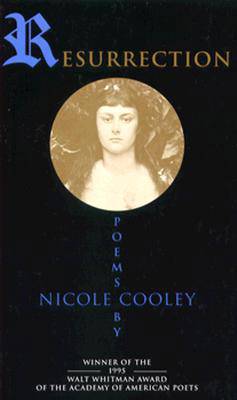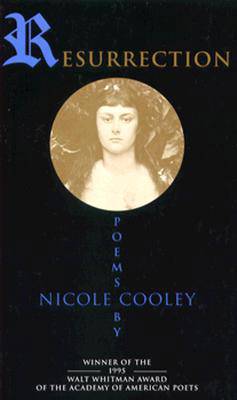
- Retrait gratuit dans votre magasin Club
- 7.000.000 titres dans notre catalogue
- Payer en toute sécurité
- Toujours un magasin près de chez vous
- Retrait gratuit dans votre magasin Club
- 7.000.0000 titres dans notre catalogue
- Payer en toute sécurité
- Toujours un magasin près de chez vous
Récompenses
Description
Frida Kahlo, Helen Keller, Diane Arbus, Alice Liddell, Patty Hearst, Snow White, Thumbelina--real and imaginary women transfigured by suffering--speak in Nicole Cooley's Resurrection, winner of the 1995 Walt Whitman Award.
As Cooley explores the bonds between sisters, mothers and daughters, grandmothers and granddaughters, this important book follows a chorus of women's voices along a hallucinatory nexus of terror. These are the voices of the martyred, the imprisoned, the exiled, the silenced, the forgotten, and as they shift from east-ern Europe to Cambodia to New Orleans, it becomes agonizingly clear that our world with its ritualized misogyny is a dangerous place for women. "Patty Hearst: A Love Poem," addressed to the sister who wasn't kidnapped, compares the inexorable winnowing away of personality through terror, brutality, and violation with its counterpart-the charade of "normal" family life. With a vivid lexicon of religious imagery--guilt, punishment, baptism, crucifixion, and, of course, resurrection--Cooley unflinchingly casts in lines of crystalline limpidity the voices of all women who through violence or fear were denied childhood. Over all of them floats the reassuring specter of Rose, a Hungarian matriarch, voice of guidance, of communal wisdom, of warning. Resurrection is an eloquent rendering of extreme psychological states--a disturbing invocation of rage, tenderness, solidarity, and ultimately of hope.Spécifications
Parties prenantes
- Auteur(s) :
- Editeur:
Contenu
- Nombre de pages :
- 80
- Langue:
- Anglais
- Collection :
Caractéristiques
- EAN:
- 9780807120590
- Date de parution :
- 01-04-96
- Format:
- Livre broché
- Format numérique:
- Trade paperback (VS)
- Dimensions :
- 140 mm x 234 mm
- Poids :
- 167 g

Les avis
Nous publions uniquement les avis qui respectent les conditions requises. Consultez nos conditions pour les avis.








